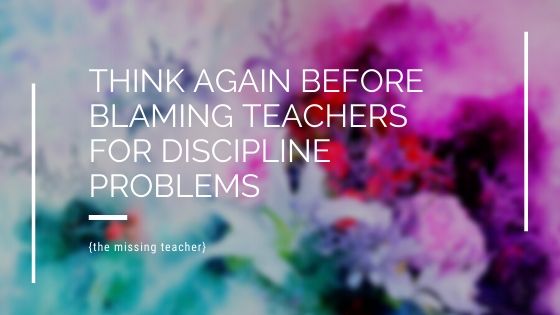Think Again Before Blaming Teachers for Discipline Problems
This article has validated what I've already known about the problems regarding teaching children today. When I was a Waldorf teacher and now as an English as a Foreign Language (EFL) teacher I've experienced how teachers are to blame for what goes wrong in the classroom. It's no wonder that teachers are leaving the profession faster than ever before.
Consider this from (April 2019) The Guardian:
Around one in five teachers (18%) expect to leave the classroom in less than two years while two-fifths of teachers, school leaders and support staff want to quit in the next five years – blaming “out of control” workload pressures and “excessive” accountability, according to a poll by the country’s biggest teaching union.
If you're looking for American statistics, here's one from (2018) Insider:
More than 40% of teachers leave the profession within five years, according to the National Education Association, leaving teacher shortages across the country.
Yes, I was asked to leave Waldorf, but one of the big reasons why was because I was considered too young (yup) and because it was perceived that my class was 'out of control'.
At a language school, where I taught, the manager pretended that discipline problems didn't exist, so teachers stopped talking to him about the issues. This created, as you might imagine, more stress. Teachers felt their opinions, and observations from the classroom didn't matter. And unbeknownst to the manager, there was resentment towards him which could have easily been alleviated had he listened and believed his teachers.
Discipline problems rarely have to do with the teacher or her teaching methods. Sure, there are things we can do, a tweak here or there. Sometimes we are unknowingly exacerbating a situation. But overall, misbehaving students will be the same students with different teachers.
Now, this isn't the case if we put a naughty student with different students. A bad seed in a good group can be counteracted or suppressed. I'm always amazed when I see peer pressure work in positive ways. Of course, a bad student can corrupt the rest or take a few down with them, too.
It's been my experience that after I've wrestled with the 'why is this student acting like this' that I treat the student with more compassion. But it's hard, especially in the teaching moment, to take a step back and try to figure out why a student is so desperate for attention. We have a tendency to believe that only the adults are walking around with baggage, but our students have issues as well.
So it's crazy to believe that the teacher is to blame for something bothering the student. And it doesn't even have to be a serious issue, sometimes diet is the problem, or lack of exercise, or someone just wanting to be the class clown. Sometimes someone isn't having only a bad day, but a bad month or year. Teachers are expected to wear many hats, and some of them are psychologist, doctor, and detective.
If we continue to blame teachers for society's problems, for individual growing pains and struggles, then we will continue to hemorrhage teachers. It's far better for the teacher and the student to work together as a team over any discipline issues that might arise in the classroom.
And if I've learned anything, what's good for the teacher is good for everybody, including the students and the school.
What's been your experience in the classroom?



Comments
Post a Comment